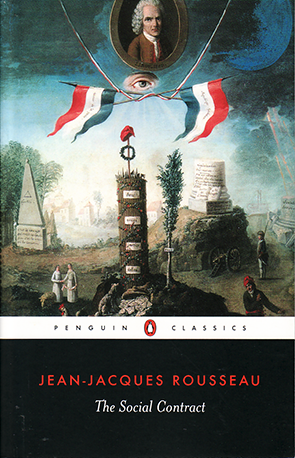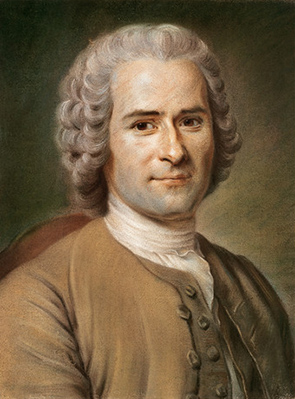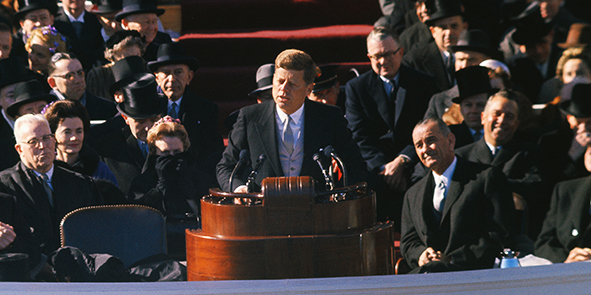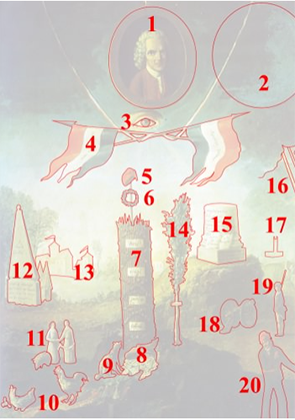John Kennedy’s inauguration speech has become a part of the modern vernacular: “Ask not what your country can do for you - ask what you can do for your country.” Kennedy was an inspirational leader who seemed to deserve the adoration he elicited. Equally inspiring was his speech announcing the Moon mission, which succeeded despite his death: “We choose to go to the Moon in this decade and do the other things, not because they are easy, but because they are hard…” This was before America became mired in Vietnam. America had won two World Wars and had emerged as a leading country of the twentieth century. But its ideology of personal freedom and opportunity was in competition with Communist ideology and countries following that doctrine: Russia, China, North Vietnam and Cuba. What was at stake wasn’t just national pride – that the Soviet Union had already launched Sputnik in 1957, or put a man in space in 1961 – but the supremacy of American ideology.
When Jean-Jacques Rousseau wrote The Social Contract, America as we now know it did not exist. It was a colony of England. The French Revolution had not happened and King Louis XV had occupied the throne of France for 47 years. In short, the models of government from which Rousseau draws his thesis did not include those more familiar to modern readers. Rather, he drew heavily upon older constitutions, like that of Venice or the Roman Empire, as models of republicanism. Nevertheless, his writing is still of relevance to modern readers. In fact, Rousseau offers a perspective, without the disadvantages of modern partisanship, which is relevant to the pressures within our own societies, which pit the rights of individuals against the state.
When Kennedy made his speeches in the sixties I think he implicitly – perhaps without meaning to – drew upon the ideals of writers like Rousseau, whose documents form part of the intellectual environment of the Enlightenment, and thereby of modern thought and government. Kennedy’s inauguration speech – “Ask not…” – demonstrates that there is an assumed relationship between the state and individual which requires a level of responsibility to maintain. Kennedy’s speech implies that the ingenuity of the individual is welcomed by the state, and thereby protected by it, whereas Soviet plans under Stalin had crushed individuals for the purposes of the state and its control. Kennedy’s determination to go to the Moon was “one which we intend to win”, expressing the obvious desire not to be beaten by the Soviet’s again. But also implied in this victory, is ideological hegemony: that a republic founded on democratic ideals was as capable as centralised government to achieve large goals.
My interest in Rousseau’s book has been building as I have seen the story of America unfold. When I watched the events of January 6, 2021 at the American Capitol, or the responses to that on both sides of the political spectrum, I perceive there is a struggle between different groups over the nature of the relationship between the individual and parties, and the state: whether the rules that brought America into being and made it great – I don’t think Donald Trump understands what made America great beyond economic transactions – can continue to exist. When I watch the arguments over masks and vaccines, over abortion and voting rights, over guns and gun control, these seem, to me, to be arguments that can be informed by reading Rousseau.
But to start with, you don’t really need to read Rousseau, exclusively, to form some opinion about this kind of thing. The wonderful thing about fiction is that it can speak to the everyday world as much as philosophy or political writing. I first encountered some of the thinking of Rousseau – I did not know it at the time – when I read T.H. White’s The Once and Future King. I read it inside a week, despite its size and the demands of work notwithstanding. I was engrossed, rushing through the pages, eating up the story, its humour and drama, along with some simple but compelling ideals.
Picture a world in which knights rule. These are young, powerful lords with wealth. It sounds romantic, but the romance of knights in stories comes not from their power but the limitation and channelling of that power through law. Before the introduction of Arthur’s law, knights are laws unto themselves. They take what they want and do what they want because they are powerful, and the only limitation to that is the power and skill of another knight. This is the doctrine, as it is expressed by White, that “might is right”. Rousseau questions this doctrine. There is no morality in being forced to obey: “it must be admitted, might does not make right, and that the duty of obedience is owed only to legitimate powers.” Rousseau also raises another weakness in the doctrine, that “The strongest man is never strong enough to be master all the time…” The fallacy that one can protect oneself – this is central in the ideology of many right wing proponents of America’s Second Amendment – is undermined by the reality of the world this ideology envisages. A civilised country can only sustain so many Carl Rittenhouses before the rule of law is twisted by individual rule, which is separate to what Rousseau calls the ‘social contract’.
This is what is central to Rousseau’s thinking. That there exists a ‘natural’ and a ‘civil’ society. “Natural liberty” is predicated on the power of the individual to attain and protect what can be acquired and “possessed” – that is, “might is right” – while ‘civil liberty’ protects the individual through laws, requiring the individual to surrender their ‘natural’ freedom for ‘civic’ freedom: that is, “might for right” – through which property and civic freedom is created:
The founder of nations must weaken the structure of man in order to fortify it, to replace the physical and independent existence we have all received from nature with a moral and communal existence. In a word each man must be stripped of his own powers, and given powers which are external to him, and which he cannot use without the help of others.
It is this kind of society that is widely admired when people talk of chivalry. Chivalry was a code of conduct that limited the power of knights to act with impunity to the full extent of their powers:
What man loses by the social contract is his natural liberty and the absolute right to anything that tempts him and that he can take; what he gains by the social contract is civil liberty and the legal right of property in what he possesses.
In this spirit, chivalry, a form of law, ushers in good society and culture, which cannot exist otherwise. Courtly romance, for all the criticism that modern critics might level at it for its implicit sexism, is an expression of civil liberty – the knight woos his lady – rather than natural liberty, where he rapes her.
But while this example provides a good understanding of what Rousseau is talking about when he talks about the Social Contract, it begins to take us some way from the key tenets of his work. Rousseau takes pains to demonstrate that freedom is not without costs: that you cannot exist within a society that protects you from murder by law, for instance, but expect that you might murder with impunity.
This suggests that no freedom is absolute, since a world in which natural freedoms are not exchanged for civic freedoms is a much more brutish and dangerous world than a world in which they are. This is a difficulty in the current social discourse, in which freedom is sometimes understood as the freedom not to follow the direction given by authority or the rights of others; in which the freedom to possess firearms or refuse vaccination or wear masks is not weighed against the benefits that civic freedom implies.
This brings me to one of the more interesting and controversial statements made by Rousseau in The Social Contract: “whoever refuses to obey the general will shall be constrained to do so by the whole body, which means nothing other than that he shall be forced to be free.” Taken out of context, the idea of “forced” freedom is both paradoxical and smells of fascism. But Rousseau is not speaking literally. Much of his language is metaphorical. Often, for instance, when he speaks of the ‘sovereign’ he is not speaking about a king or other kind of monarch, but the will of the people which is the basis of a constitution and the laws that derive from that. America’s constitution is predicated upon this very notion. When Rousseau speaks of ‘forcing’ someone to be free, his remark is based upon the idea that true freedom exists within the social contract itself, and any act against the tenets and institutions that derive from the contract which forms society, limits the freedom of everyone in that society (since civil society is based on law, which must replace individual force), including the person who has broken a law.
I think it is these ideas that modern readers might be most interested in exploring when reading Rousseau. The Supreme Court’s 2008 ruling (DC vs Heller) that individuals had the right to own weapons independent of their participation in militias, for instance, is a modern interpretation of the Second Amendment. But the Second amendment has received umpteen emendations like this, revealing a shift in the constitution that seeks to remain relevant to changing attitudes. If the Second Amendment was included in the Bill of Rights to ensure a check on federal power, or that it reflected a concern about the potential of further foreign interference in America, the 2008 ruling reflects, to me, a concern closer to natural rather than civil rights, as defined by Rousseau. As the Big Lie continues to be told and believed by many in America, the questions of “when do we get to use the guns” and “when do we get to kill these people?” have been asked more than once, now, by members of right wing audiences. Whereas Rousseau explains that the freedom offered by civil society is to participate in its benefits rather than to always have one’s way. That’s something a reading of Rousseau offers when struggling to address some of the issues modern society is now facing.
Of less relevance to a modern society, perhaps, is the examples Rousseau uses of states, and his discussion of how states are maintained, since these are based upon examples prior to the French and American Revolutions, as well as social circumstances that predate modern technologies. So, when Rousseau speaks about the limitations of populations for certain kinds of government, or the effect of climate or the size of territories, we understand that we have to interpret his discussion in the light of the modern world.
Of course, his discussion has historical value. His long discussion of the Roman Republic in the last part of his book is less applicable to modern audiences, but of interest to students of history, in terms of his analysis of Roman institutions and the way they inform his thinking. His discussion of the broad structure of government is also informative. In looking at any modern Western government (but I’ll use America since that is what I’ve used so far) it is easy to forget that the government is structured upon traditional government and social structures: the President is like an elected monarch (or consul, to use the Roman example), while Congress is divided into aristocratic and democratic institutions: the Senate and House of Representatives. Rousseau discusses how these different forms of government may be formed and work together. In discussing forms of government in this way, Rousseau may offer modern readers a new perspective on the workings of their own governments.
In the end, I think Rousseau’s work is valuable in that it offers us a philosophical approach to our relationship with society: that we are free, not because we can do whatever we like, but because we exist as part of a relationship with society and government which gives us rights and protections. It also implies a set of responsibilities that are accompanied by opportunities which Kennedy alluded to in his inauguration speech.
Note: If you’re interested in Rousseau’s ideas, I suggest you read Rousseau rather than limiting yourself to this review. If you disagree with the ideas presented here, I still suggest you read Rousseau, rather than relying upon my interpretation, which is personal and selective.

 RSS Feed
RSS Feed Facebook
Facebook Instagram
Instagram YouTube
YouTube Subscribe to our Newsletter
Subscribe to our Newsletter





No one has commented yet. Be the first!